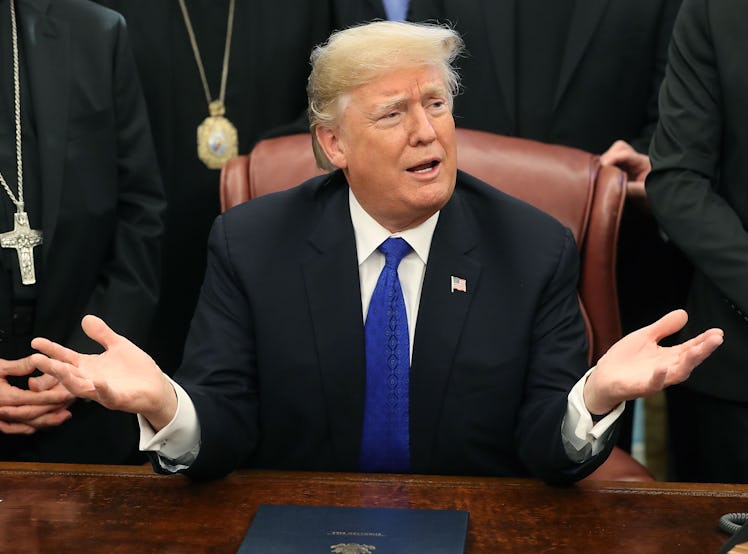
What Might Happen If A President Breaks The Law Isn't As Simple As You Think
Donald Trump, as a candidate for president in 2016, famously bragged that he "could stand in the middle of Fifth Avenue and shoot somebody" and wouldn't lose any of his voters. And who knows what would happen if he actually did. But now that he's in power nearly three years later, that question is becoming more and more relevant, albeit in a different context. What happens if a president breaks the law? Here's a hint: Losing voters probably wouldn't be the chief concern.
The short answer: If a president breaks the law, they would be charged with a crime. The slightly longer answer: They would probably be charged at some point, but when that happens depends on what law and when they broke it. And as with almost everything in politics: There's a catch.
There are two ways Trump could be held accountable for wrongdoing: impeachment or indictment. Bear in mind, being charged with a crime and actually facing punishment aren't the same thing (though the latter is somewhat dependent on the former).
For impeachment, Congress can vote to bring a case against and try the president. A conviction here would lead to removing and barring him from office, and is entirely separate from a criminal case. No crime or conviction is necessary to impeach a president, as legal scholar Barbara Radnofsky told Elite Daily in August. As of Dec. 14, there have been no formal moves to impeach Trump.
While Democrats in January will be ascending to power in the House of Representatives, where impeachment proceedings begin, it's unlikely any such case would lead to a conviction in the Republican-majority Senate. But remember, this isn't necessarily about lawbreaking: Congress simply has to feel that the officer is not carrying out their duties honorably or presents a substantial risk to the country or the public's confidence in that office.
As for criminal prosecution, the Supreme Court has routinely made it clear that "no one is above the law," not even the nation's highest officer. But the Department of Justice (DOJ) position is that it's against guidelines to indict presidents while in office, to avoid interfering with the day-to-day duties of the presidency. So, any charges would likely only happen after a president leaves office.
However, it's up for debate if a special prosecutor like Robert Mueller, under certain circumstances, might actually have the power to charge a sitting president. There's no law that forbids a president from being charged with crimes in office. And some legal scholars believe the Constitution actually calls for a president to be indicted in office, should they commit a crime, as the only means for holding them liable to the law. As of Dec. 14, Trump has not been formally accused of or charged with any crime.
Here's the catch: If a prosecutor waits until a president is out of office to charge them, a successor could easily pardon the former president and simply wipe away any punishment. (That's what happened to Richard Nixon, who after his resignation was pardoned by successor Gerald Ford.) So, indictment in office is potentially the only path to a substantive criminal punishment.
Because impeachment and indictment are separate and not mutually exclusive, you could easily have both happen. For an impeachment conviction, punishment would mean a president is removed and barred from holding office again; a criminal conviction could mean prison time, monetary penalties, or other punishments depending on the crimes.
The question is more and more relevant now as developments are revealing to the public snippets of what federal investigators have learned about the key players in Trump's orbit and the events that took place ahead of the election.
Special Counsel Robert Mueller's investigation has not yet issued its final report, but several developments prove there's a lot on the way. Trump's former personal attorney Michael Cohen was sentenced on Dec. 12 for crimes relating to Trump's 2016 campaign; Trump's former national security adviser Michael Flynn's sentencing memo was released on Dec. 7, suggesting his cooperation in a highly secretive investigation; Russian gun-rights activist Maria Butina pleaded guilty on Dec. 13 in connection with attempting to influence the 2016 election; and Trump's former campaign chairman Paul Manafort is due for his sentencing hearing in January after pleading guilty to an array of crimes.
So, there's plenty on tap to keep Trump's legal team on its toes. But any number of things could happen if it's discovered that he has in fact broken the law. But one way or another, no one is above the law, and none of these options would be particularly favorable for him.